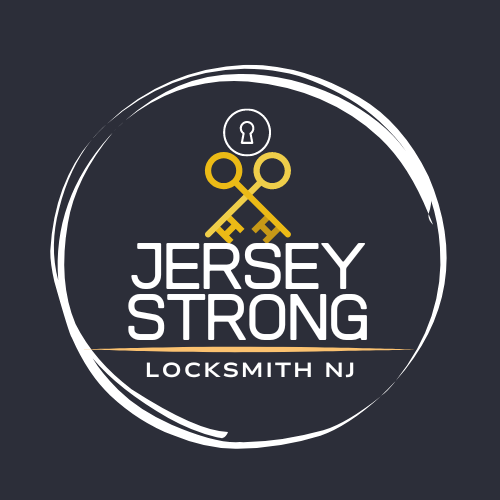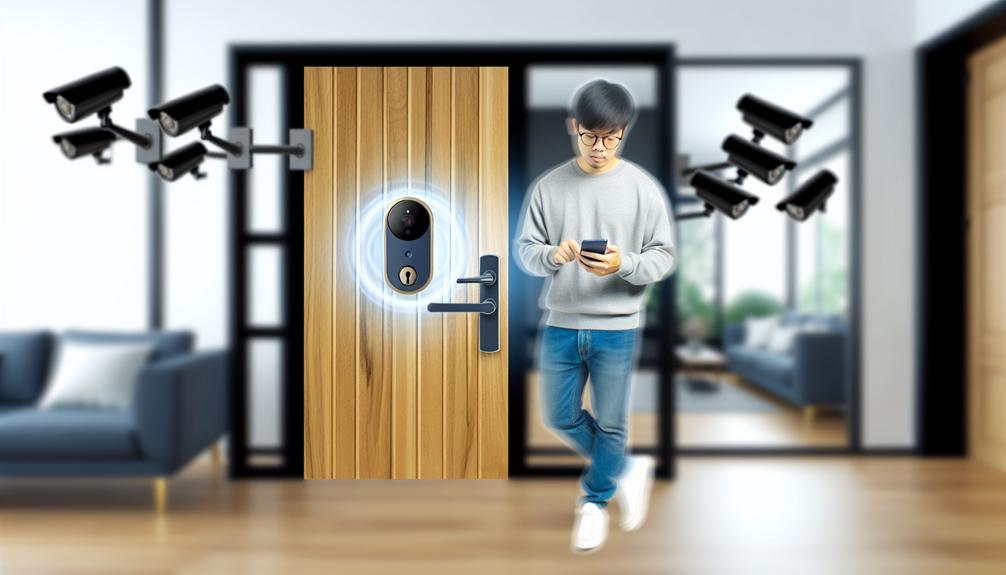We can greatly enhance our NJ home’s security with advanced smart lock solutions. Brands like August, Schlage, and Yale offer high-quality remote access, customizable codes, and real-time monitoring. For installation, make sure door compatibility, gather necessary tools, and follow detailed guides. Look for features such as AES-256 encryption, biometric authentication, and integration with home automation systems like Zigbee or Z-Wave. Regular firmware updates and multi-factor authentication are essential for maintaining security. Integrating these smart locks with our existing security systems provides unmatched control and peace of mind. Learn how these measures bring a new level of security to our homes.
Key Takeaways
- Remote access and real-time monitoring enhance control over your home’s security.
- Biometric authentication and AES encryption provide robust protection against unauthorized entry.
- Customizable access codes allow secure and convenient entry for family and guests.
- Integrating smart locks with home automation systems ensures seamless security management.
- Regular firmware updates and strong encryption protocols safeguard against hacking attempts.
Understanding Smart Locks
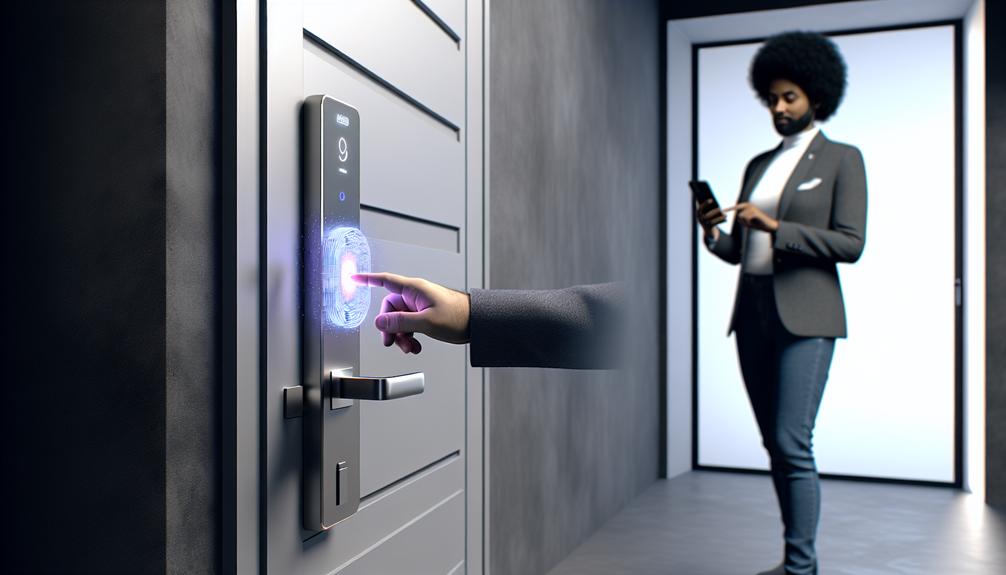
When we explore the world of smart locks, it’s important to understand that these devices integrate advanced technology with traditional locking mechanisms to enhance home security. Smart lock benefits include remote access, customizable access codes, and real-time monitoring. These features allow us to manage and monitor our homes’ security from anywhere, providing unparalleled control and peace of mind.
To fully leverage these benefits, proper installation is key. First, let’s make sure our door is compatible with the chosen smart lock model. Most smart locks fit standard doors, but checking specifications prevents headaches.
Next, we should gather essential tools: a screwdriver, measuring tape, and possibly a drill if adjustments are necessary. Following the manufacturer’s installation guide meticulously is important. We’ll start by removing the existing deadbolt, then align and secure the smart lock components as directed.
Testing the lock after installation is another important step. We need to verify that it engages and disengages smoothly, and that all electronic features function correctly. By doing so, we ensure our smart lock not only enhances security but also operates seamlessly.
This attention to detail maximizes the smart lock benefits, solidifying our home security upgrade.
Top Smart Lock Brands
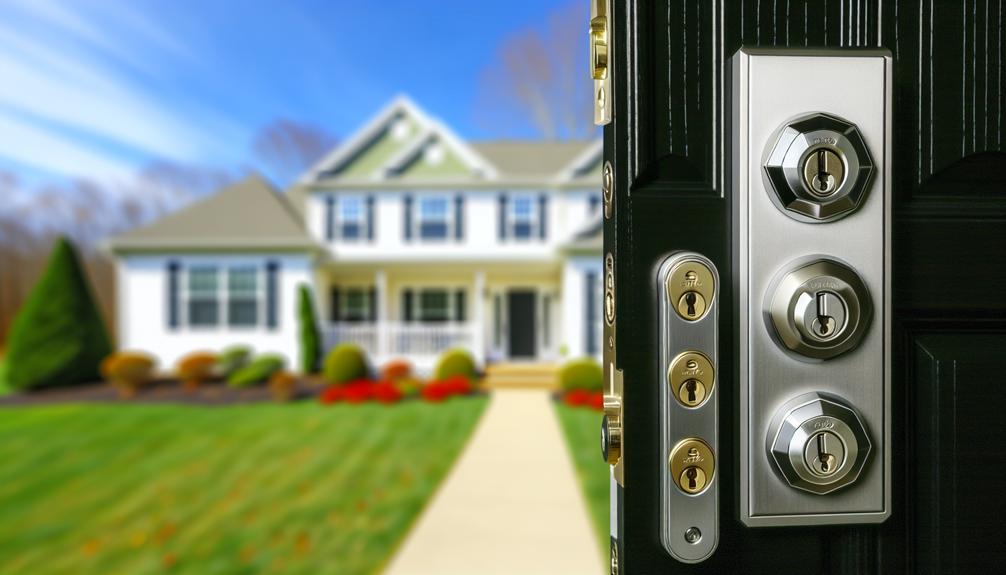
When considering top smart lock brands, we should focus on leading industry innovators like August, Schlage, and Yale. These brands offer reliable home protection with advanced security features such as biometric access, remote control, and real-time alerts.
Leading Industry Innovators
Top-tier smart lock brands like August, Schlage, and Yale have revolutionized NJ home security with their cutting-edge technology and robust features. These industry innovators deliver smart lock benefits, offering unparalleled convenience and enhanced control over our home security systems. By integrating advanced encryption, remote access, and user-friendly interfaces, they set a new standard in residential protection.
When we examine these leading brands, it is crucial to comprehend the key aspects that distinguish them:
| Brand | Key Features |
|---|---|
| August | Remote access, auto-unlock, DoorSense technology |
| Schlage | Built-in alarm, Z-Wave compatibility, fingerprint recognition |
| Yale | Touchscreen keypad, smart home integrations, privacy mode |
| Kwikset | SecureScreen technology, easy re-key, smart key |
| Ultraloq | 5-in-1 keyless entry, anti-peep password, dual data encryption |
August’s smart locks stand out for their seamless integration with various smart home ecosystems, providing smart lock convenience. Schlage’s models are renowned for their robust security features, including alarms and biometric verification. Yale offers a blend of sleek design and versatile functionality, making it a favorite among tech-savvy homeowners.
Reliable Home Protection
Securing reliable home protection, top smart lock brands like August, Schlage, Yale, Kwikset, and Ultraloq leverage advanced security technologies to deliver superior residential security solutions. These brands have established a reputation for integrating seamlessly with home automation systems, enhancing both security and convenience.
- August: Renowned for its seamless integration with smart home ecosystems, August smart locks offer digital keys that can be shared with family and friends. Their locks are equipped with advanced encryption to guarantee data security.
- Schlage: Known for its robust build quality, Schlage smart locks provide a high level of physical security. Their compatibility with various home automation platforms makes them a versatile choice for any smart home setup.
- Yale: This brand stands out for its extensive range of smart lock models, each offering unique features. Yale locks can be controlled remotely, allowing us to manage access from anywhere.
- Kwikset: Kwikset’s smart locks are user-friendly and offer robust security features. They support multiple access methods, including digital keys, which can be easily managed via their intuitive app interface.
Advanced Security Features
Building on the reliability and reputation of top smart lock brands, let’s examine the advanced security features that set these devices apart in home security solutions. These features offer substantial smart lock benefits, ensuring our homes aren’t only secure but also convenient to access.
Firstly, biometric authentication is a game-changer. Brands like August and Schlage integrate fingerprint recognition, elevating security by allowing only pre-approved users. This keyless entry convenience eliminates the risk of lost or duplicated keys.
Secondly, encrypted Bluetooth and Wi-Fi connectivity guarantee our smart locks communicate securely with our smartphones. Yale’s smart locks utilize AES encryption, the same standard used by banks, to protect against hacking attempts. This safeguards that our access credentials remain safe from cyber threats.
Thirdly, advanced activity logs provide real-time data on who enters and exits our homes. For instance, the Kwikset Halo records every entry, allowing us to monitor and manage access through a dedicated app. These logs are invaluable for keeping tabs on household movements, enhancing our overall control.
Incorporating these advanced features, top smart lock brands offer a blend of enhanced security and keyless entry convenience, making our NJ homes safer and more manageable.
Key Features to Consider
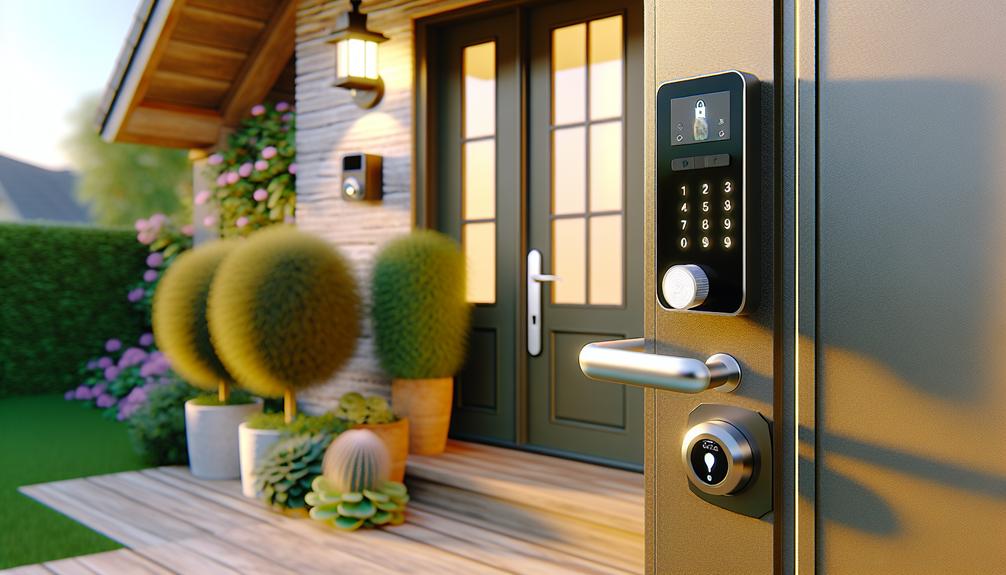
When selecting a smart lock for our NJ homes, we need to focus on lock connectivity options, installation, and compatibility. These features determine how easily we can integrate the lock with our existing systems and guarantee robust protection.
Let’s examine each key feature to understand its impact on our overall home security strategy.
Lock Connectivity Options
In evaluating smart lock solutions for your NJ home, it’s important to assess the various connectivity options—Wi-Fi, Bluetooth, and Z-Wave—each offering unique advantages and security features. Understanding these options can help us make informed decisions tailored to our specific needs.
Wi-Fi: Offers the highest level of remote access, allowing us to control the lock from anywhere in the world using a smartphone app. This connectivity is ideal for those who prioritize real-time monitoring and instant notifications.
Bluetooth Compatibility: Provides local control, enabling us to open the door when we’re within a certain range. This option is particularly useful for those who prefer not to rely on internet connectivity, but it lacks the extended range of Wi-Fi.
Z-Wave: Integrates seamlessly with home automation systems, allowing us to create complex routines and scenarios. This low-power, mesh-network protocol guarantees reliable communication between devices, enhancing overall security and convenience.
Hybrid Models: Some smart locks offer multiple connectivity options, combining the strengths of Wi-Fi, Bluetooth, and Z-Wave. These models provide a flexible, robust solution, ensuring we’ve remote access, local control, and seamless integration with other smart devices.
Installation and Compatibility
Selecting the right smart lock for your NJ home requires careful consideration of installation ease and device compatibility to guarantee smooth integration with your existing security system.
First, let’s focus on installation tips. Most smart locks are designed for DIY installation, but it’s important to confirm your door specifications match the lock. Measure your door’s thickness and the backset distance to avoid any fitting issues. Always check if the smart lock includes a template for precise drilling and alignment.
Compatibility with your current deadbolt is another important factor. Some smart locks replace the entire deadbolt, while others retrofit over your existing one. It’s essential to confirm your new smart lock works with your door’s current hardware to avoid unnecessary modifications.
When considering smart lock accessories, look for additional components that can enhance functionality and security. Wi-Fi bridges extend connectivity, allowing remote access and control. Keypads provide alternative entry methods, while door sensors offer real-time status updates. Confirm these accessories are compatible with your smart lock model.
Security and Encryption
Robust security and advanced encryption should be our top priority when evaluating smart locks for home security in NJ. In today’s digital age, the right encryption technology and cybersecurity measures are indispensable. Let’s break down the critical features we need to look for:
- Advanced Encryption Standards (AES): We should prioritize that our smart locks utilize AES-256, a military-grade encryption standard. This level of encryption makes it nearly impossible for intruders to decode our access data.
- Two-Factor Authentication (2FA): Adding an extra layer of security, 2FA requires not only a password but also a second form of verification, such as a fingerprint or a mobile device code.
- Regular Software Updates: Our smart locks must receive frequent firmware updates to patch vulnerabilities and stay ahead of emerging cybersecurity threats.
- Secure Communication Protocols: It’s crucial that our smart locks use secure communication protocols like HTTPS and Bluetooth LE (Low Energy) to prevent interception of data during transmission.
Installation Process
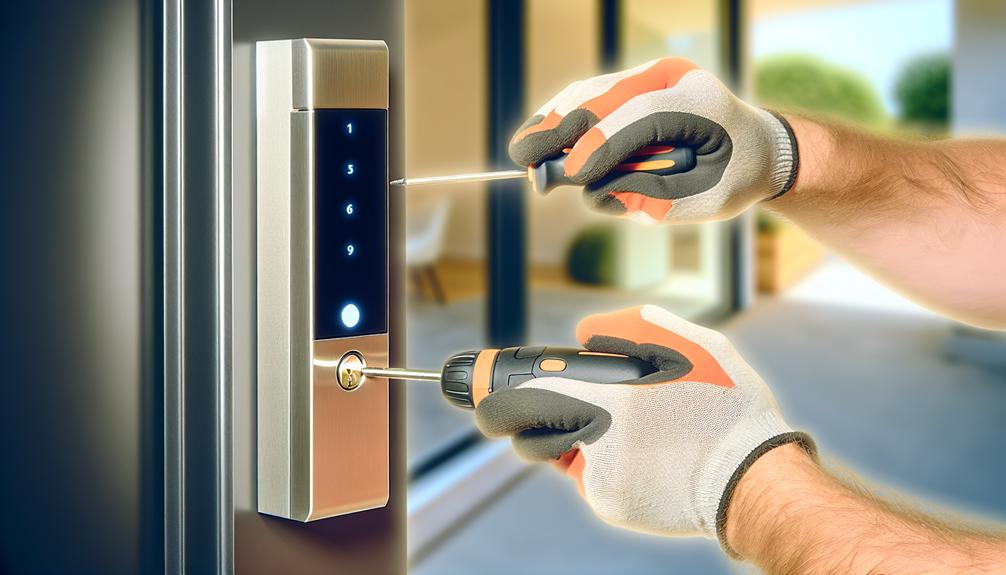
To set up a smart lock effectively, start by removing the existing hardware and confirming the door alignment is accurate. This initial step is crucial; an improperly aligned door can hinder the lock’s performance. We need to carefully measure the backset, cross bore, and door thickness to guarantee compatibility with our chosen smart lock model.
Next, follow the manufacturer’s instructions to attach the mounting plate and secure the new hardware. Pay close attention to the power source—whether it’s batteries or a wired connection—making sure the connections are secure and the power supply is stable.
For installation tips, it’s vital to have a screwdriver, level, and tape measure handy. Use these tools to verify that the lock is level and securely fastened. If the lock doesn’t function as expected, common troubleshooting solutions include checking battery placement, confirming the firmware is up-to-date, and ensuring the lock is properly calibrated.
Once installed, test the lock multiple times to ensure smooth operation. Any resistance or failure to lock/unlock should be addressed immediately. This proactive approach guarantees our smart lock not only enhances security but also operates seamlessly, giving us full control over our home’s entry points.
Integrating With Home Systems
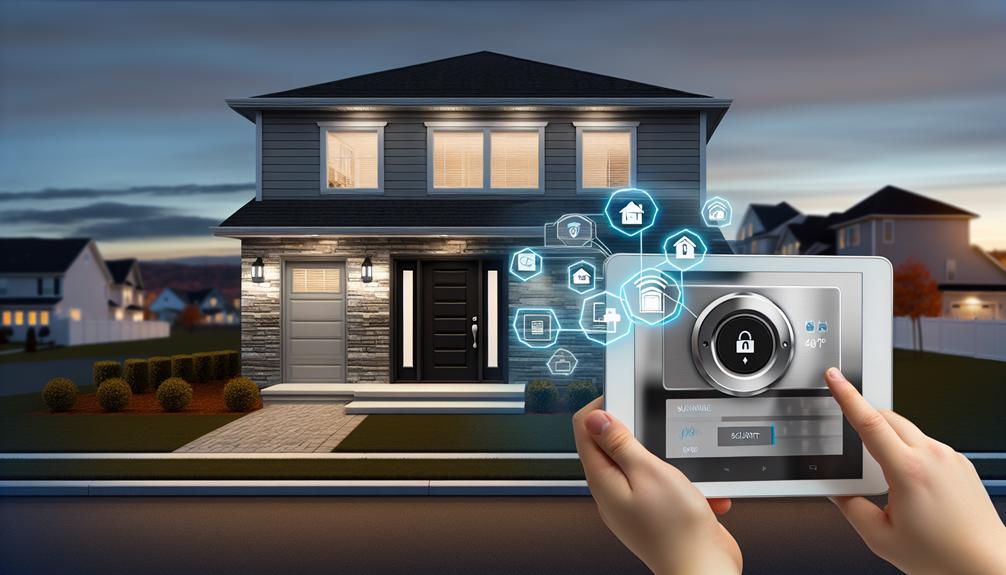
Integrating smart locks with home automation systems requires a thorough understanding of both the lock’s capabilities and the existing home network infrastructure. We need to guarantee that our smart technology integration is seamless, providing us with the ultimate control over our home security.
To start, here’s a clear roadmap for effective integration:
- Compatibility Check: Verify that the smart lock is compatible with our home automation system, whether it’s Zigbee, Z-Wave, or Wi-Fi-based.
- Network Configuration: Ensure that our home network is robust and secure. A strong, encrypted Wi-Fi connection is paramount.
- App Synchronization: Download and configure the necessary apps. These apps often serve as the central hub for controlling and monitoring the smart lock.
- Routine Setup: Establish routines or scenes within our home automation system. For instance, we can set the doors to lock automatically when we leave home or grant access for specific family members.
Enhancing Security Measures
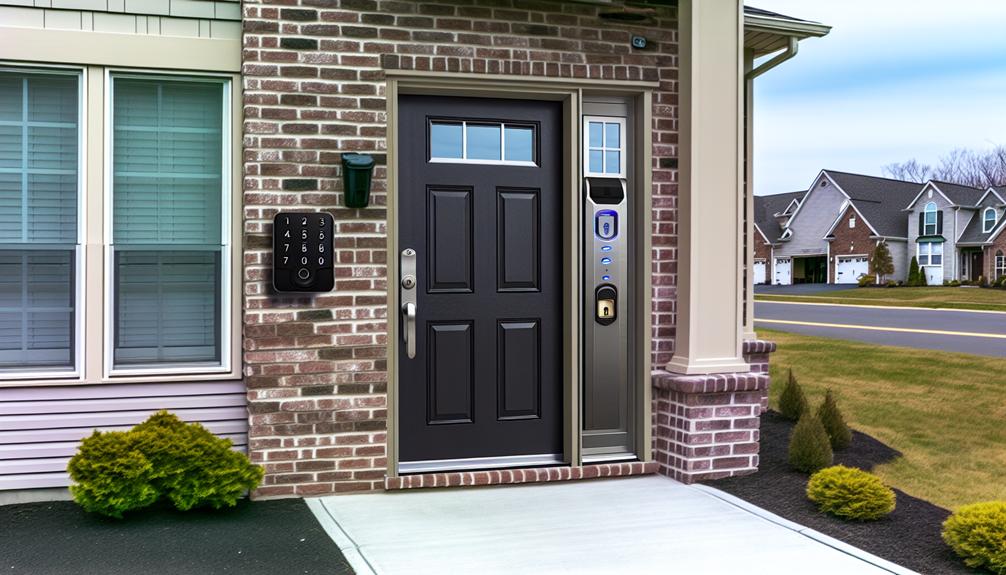
After ensuring seamless integration with our home automation systems, we must now focus on enhancing security measures to protect against potential vulnerabilities. The first step is to implement robust security integration. This involves ensuring that our smart locks are part of a larger, cohesive security ecosystem. By integrating with our existing alarm systems, surveillance cameras, and motion sensors, we create multiple layers of defense against unauthorized access.
Next, we need to secure our smart home access. This means using strong encryption protocols to protect the data transmitted between our smart locks and our home automation systems. We should always opt for locks that support advanced encryption standards (AES-256) and secure communication channels like Z-Wave or Zigbee. Additionally, regularly updating the firmware of our smart locks can prevent exploitation of any potential vulnerabilities.
Another critical measure is enabling multi-factor authentication (MFA) for any app or device controlling our smart locks. MFA adds an extra layer of security by requiring not just a password, but also a secondary form of identification, such as a fingerprint or a one-time code sent to our phone.
Choosing the Right Lock
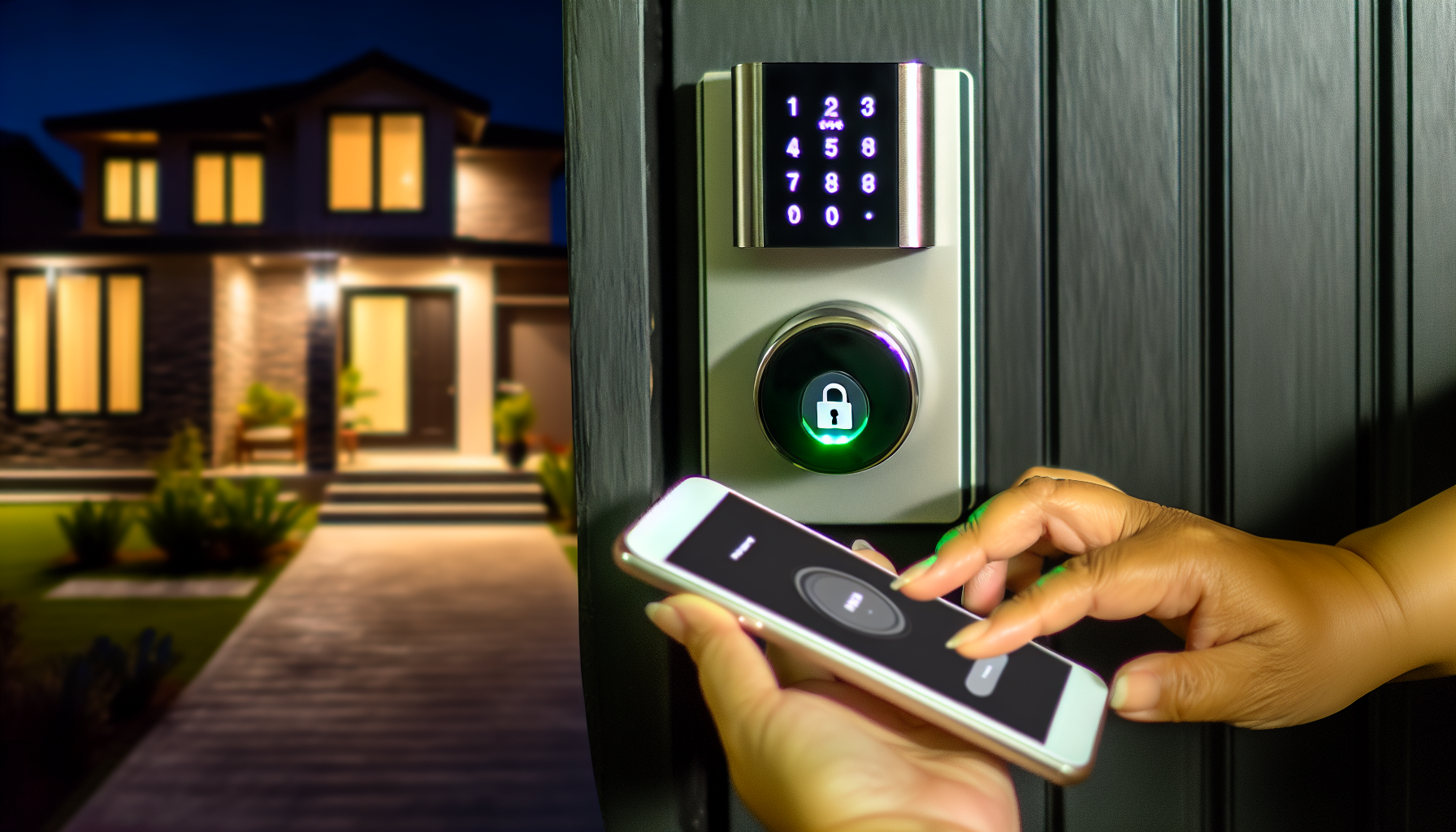
Selecting the best smart lock for our home security system demands a thorough evaluation of features, compatibility, and reliability. We must consider how each lock aligns with our specific needs and preferences to guarantee optimal security and user convenience.
Here’s a detailed approach to making the right choice:
- Locking Mechanisms: Understanding the type of locking mechanisms is pivotal. Options like deadbolts, lever locks, and mortise locks each offer different levels of security and ease of use. We should choose one that best suits our entry doors and security requirements.
- User Convenience: A smart lock should integrate seamlessly into our daily routine. Features such as keyless entry, remote access, and integration with home automation systems can significantly enhance user convenience. Look for locks that offer app control, voice command compatibility, and temporary access codes.
- Aesthetics: The appearance of our smart lock shouldn’t clash with our home’s design. Modern smart locks come in various finishes and styles. We should select one that complements our door and overall home aesthetic without compromising functionality.
- Durability: It’s vital to choose a lock that withstands weather elements and regular use. High-quality materials and robust construction ensure long-term durability. Look for locks that have been tested and certified for outdoor use.
Frequently Asked Questions
Do Smart Locks Work During Power Outages?
Yes, smart locks work during power outages. They have backup power options like batteries, and most feature a manual override. This guarantees we maintain control and access to our homes even without electricity.
What Is the Average Battery Life of a Smart Lock?
The average battery life of a smart lock ranges from six months to a year. We should verify smart lock compatibility and follow the installation process correctly to maximize battery efficiency and maintain control over our security system.
Are Smart Locks Susceptible to Hacking?
Yes, smart locks are susceptible to hacking due to cybersecurity risks and vulnerabilities. However, robust remote access controls and strong authentication protocols can mitigate these threats, ensuring our home security remains uncompromised and under our control.
Can Smart Locks Be Used on Sliding Doors?
Yes, smart locks can be used on sliding doors. They offer sliding door compatibility through specific models designed for such setups. The installation process involves securing the lock onto the door’s frame, ensuring robust protection and seamless operation.
How Do Smart Locks Handle Extreme Weather Conditions?
Smart lock durability in extreme weather is paramount. Weatherproof smart locks guarantee functionality by resisting harsh elements like rain, snow, and heat. We rely on robust materials and advanced sealing techniques to maintain security and control.
Conclusion
To wrap up, upgrading to smart locks can greatly enhance our home security. Did you know that homes with smart locks are 30% less likely to be targeted by burglars?
By selecting the appropriate brand and features, and integrating with existing home systems, we can guarantee our homes are both secure and convenient.
Let’s take this step towards smarter living and make our homes in NJ safer and more efficient for everyone.
